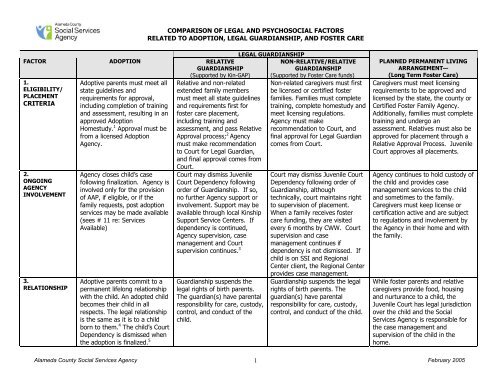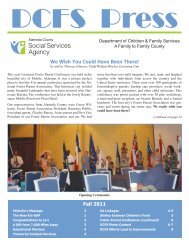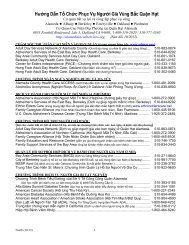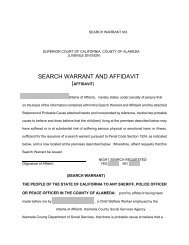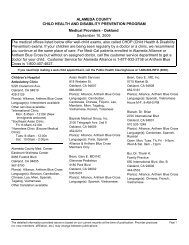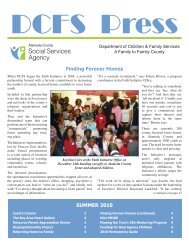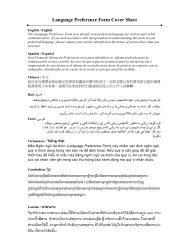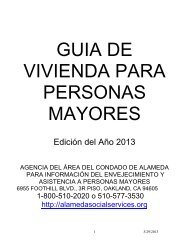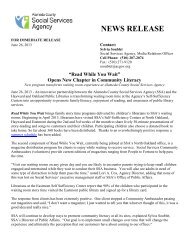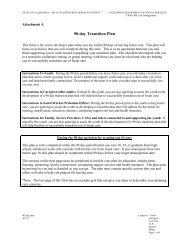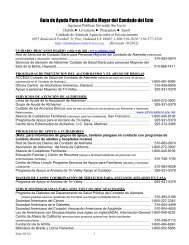comparison of adoption, legal guardianship/kin-gap, and foster care
comparison of adoption, legal guardianship/kin-gap, and foster care
comparison of adoption, legal guardianship/kin-gap, and foster care
Create successful ePaper yourself
Turn your PDF publications into a flip-book with our unique Google optimized e-Paper software.
COMPARISON OF LEGAL AND PSYCHOSOCIAL FACTORS<br />
RELATED TO ADOPTION, LEGAL GUARDIANSHIP, AND FOSTER CARE<br />
FACTOR ADOPTION RELATIVE<br />
GUARDIANSHIP<br />
(Supported by Kin-GAP)<br />
1.<br />
ELIGIBILITY/<br />
PLACEMENT<br />
CRITERIA<br />
2.<br />
ONGOING<br />
AGENCY<br />
INVOLVEMENT<br />
3.<br />
RELATIONSHIP<br />
Adoptive parents must meet all<br />
state guidelines <strong>and</strong><br />
requirements for approval,<br />
including completion <strong>of</strong> training<br />
<strong>and</strong> assessment, resulting in an<br />
approved Adoption<br />
Homestudy. 1 Approval must be<br />
from a licensed Adoption<br />
Agency.<br />
Agency closes child’s case<br />
following finalization. Agency is<br />
involved only for the provision<br />
<strong>of</strong> AAP, if eligible, or if the<br />
family requests, post <strong>adoption</strong><br />
services may be made available<br />
(sees # 11 re: Services<br />
Available)<br />
Adoptive parents commit to a<br />
permanent lifelong relationship<br />
with the child. An adopted child<br />
becomes their child in all<br />
respects. The <strong>legal</strong> relationship<br />
is the same as it is to a child<br />
born to them. 4 The child’s Court<br />
Dependency is dismissed when<br />
the <strong>adoption</strong> is finalized. 5<br />
Relative <strong>and</strong> non-related<br />
extended family members<br />
must meet all state guidelines<br />
<strong>and</strong> requirements first for<br />
<strong>foster</strong> <strong>care</strong> placement,<br />
including training <strong>and</strong><br />
assessment, <strong>and</strong> pass Relative<br />
Approval process; 2 Agency<br />
must make recommendation<br />
to Court for Legal Guardian,<br />
<strong>and</strong> final approval comes from<br />
Court.<br />
Court may dismiss Juvenile<br />
Court Dependency following<br />
order <strong>of</strong> Guardianship. If so,<br />
no further Agency support or<br />
involvement. Support may be<br />
available through local Kinship<br />
Support Service Centers. If<br />
dependency is continued,<br />
Agency supervision, case<br />
management <strong>and</strong> Court<br />
supervision continues. 3<br />
Guardianship suspends the<br />
<strong>legal</strong> rights <strong>of</strong> birth parents.<br />
The guardian(s) have parental<br />
responsibility for <strong>care</strong>, custody,<br />
control, <strong>and</strong> conduct <strong>of</strong> the<br />
child.<br />
LEGAL GUARDIANSHIP<br />
NON-RELATIVE/RELATIVE<br />
GUARDIANSHIP<br />
(Supported by Foster Care funds)<br />
Non-related <strong>care</strong>givers must first<br />
be licensed or certified <strong>foster</strong><br />
families. Families must complete<br />
training, complete homestudy <strong>and</strong><br />
meet licensing regulations.<br />
Agency must make<br />
recommendation to Court, <strong>and</strong><br />
final approval for Legal Guardian<br />
comes from Court.<br />
Court may dismiss Juvenile Court<br />
Dependency following order <strong>of</strong><br />
Guardianship, although<br />
technically, court maintains right<br />
to supervision <strong>of</strong> placement.<br />
When a family receives <strong>foster</strong><br />
<strong>care</strong> funding, they are visited<br />
every 6 months by CWW. Court<br />
supervision <strong>and</strong> case<br />
management continues if<br />
dependency is not dismissed. If<br />
child is on SSI <strong>and</strong> Regional<br />
Center client, the Regional Center<br />
provides case management.<br />
Guardianship suspends the <strong>legal</strong><br />
rights <strong>of</strong> birth parents. The<br />
guardian(s) have parental<br />
responsibility for <strong>care</strong>, custody,<br />
control, <strong>and</strong> conduct <strong>of</strong> the child.<br />
PLANNED PERMANENT LIVING<br />
ARRANGEMENT—<br />
(Long Term Foster Care)<br />
Caregivers must meet licensing<br />
requirements to be approved <strong>and</strong><br />
licensed by the state, the county or<br />
Certified Foster Family Agency.<br />
Additionally, families must complete<br />
training <strong>and</strong> undergo an<br />
assessment. Relatives must also be<br />
approved for placement through a<br />
Relative Approval Process. Juvenile<br />
Court approves all placements.<br />
Agency continues to hold custody <strong>of</strong><br />
the child <strong>and</strong> provides case<br />
management services to the child<br />
<strong>and</strong> sometimes to the family.<br />
Caregivers must keep license or<br />
certification active <strong>and</strong> are subject<br />
to regulations <strong>and</strong> involvement by<br />
the Agency in their home <strong>and</strong> with<br />
the family.<br />
While <strong>foster</strong> parents <strong>and</strong> relative<br />
<strong>care</strong>givers provide food, housing<br />
<strong>and</strong> nurturance to a child, the<br />
Juvenile Court has <strong>legal</strong> jurisdiction<br />
over the child <strong>and</strong> the Social<br />
Services Agency is responsible for<br />
the case management <strong>and</strong><br />
supervision <strong>of</strong> the child in the<br />
home.<br />
Alameda County Social Services Agency 1<br />
February 2005
COMPARISON OF LEGAL AND PSYCHOSOCIAL FACTORS<br />
RELATED TO ADOPTION, LEGAL GUARDIANSHIP, AND FOSTER CARE<br />
FACTOR ADOPTION RELATIVE<br />
GUARDIANSHIP<br />
(Supported by Kin-GAP)<br />
4.<br />
PERMANENCE<br />
Adoption is a lifelong <strong>legal</strong>ly<br />
binding relationship <strong>and</strong><br />
provides the highest level <strong>of</strong><br />
<strong>legal</strong> permanence. 6 The<br />
adoptive parent(s) become the<br />
<strong>legal</strong> parents. Birth parents<br />
rights are terminated, <strong>and</strong> birth<br />
parents cannot reclaim the<br />
child. 7<br />
Guardianship provides<br />
permanence, however, it is not<br />
as <strong>legal</strong>ly secure as <strong>adoption</strong>;<br />
the Court can terminate<br />
<strong>guardianship</strong>, <strong>and</strong> birth<br />
parents can petition the court<br />
to terminate the <strong>guardianship</strong>,<br />
or the Legal Guardian may ask<br />
the court to dismiss<br />
<strong>guardianship</strong>. Birth parents’<br />
rights are usually not<br />
terminated, <strong>and</strong> birth parents<br />
may have the right to visit the<br />
child. The Legal Guardian has<br />
authority to allow birth parents<br />
to be involved in decisions re:<br />
the child. Legal Guardianship<br />
ends at age 18, or may be<br />
extended if youth is still in<br />
high school.<br />
LEGAL GUARDIANSHIP<br />
NON-RELATIVE/RELATIVE<br />
GUARDIANSHIP<br />
(Supported by Foster Care funds)<br />
Guardianship provides<br />
permanence, however it is not as<br />
<strong>legal</strong>ly secure as <strong>adoption</strong>. The<br />
Court can terminate the<br />
<strong>guardianship</strong>, <strong>and</strong> birth parents<br />
can petition the court to<br />
terminate the <strong>guardianship</strong>, or<br />
the Legal Guardian may ask the<br />
court to dismiss the <strong>guardianship</strong>.<br />
Birth parents’ rights are usually<br />
not terminated, <strong>and</strong> birth parents<br />
may have the right to visit the<br />
child. The Legal Guardian has<br />
authority to allow birth parent to<br />
be involved in decisions re: the<br />
child.<br />
Legal Guardianship ends at age<br />
18, or may be extended if youth<br />
is still in high school.<br />
PLANNED PERMANENT LIVING<br />
ARRANGEMENT—<br />
(Long Term Foster Care)<br />
Foster <strong>care</strong> is meant to be<br />
temporary, <strong>and</strong> does not provide<br />
<strong>legal</strong> permanence for a child. The<br />
Agency continues to maintain<br />
custody <strong>of</strong> the child through 18 th<br />
birthday or until age 19/HS<br />
graduation. Court can continue<br />
jurisdiction up to age 21. (WIC 303).<br />
The birth parents can challenge<br />
continuing need for custody in Court.<br />
The Agency can remove the child<br />
from the <strong>care</strong>giver’s home, or the<br />
<strong>care</strong>giver can request child’s<br />
removal. Placement can disrupt at<br />
any time. Birth parents rights are<br />
generally not terminated, <strong>and</strong> birth<br />
parents maintain right to visit <strong>and</strong> be<br />
involved in major decisions regarding<br />
the child, depending on case<br />
situation. The Agency makes<br />
recommendations to Court regarding<br />
the child, <strong>and</strong> the Juvenile Court<br />
makes major decisions.<br />
Alameda County Social Services Agency 2<br />
February 2005
COMPARISON OF LEGAL AND PSYCHOSOCIAL FACTORS<br />
RELATED TO ADOPTION, LEGAL GUARDIANSHIP, AND FOSTER CARE<br />
FACTOR ADOPTION RELATIVE<br />
GUARDIANSHIP<br />
(Supported by Kin-GAP)<br />
5.<br />
PARENTING<br />
RIGHTS AND<br />
RESPONSI-<br />
BILITIES<br />
6.<br />
EDUCATIONAL<br />
DECISIONS<br />
Adoptive parents possess all<br />
parenting rights <strong>and</strong><br />
responsibilities for the child. 8<br />
Adoptive parents make all<br />
decisions regarding the<br />
education <strong>of</strong> the child. They can<br />
request special services from<br />
schools, regional centers <strong>and</strong><br />
any other service provider.<br />
Legal Guardians possess<br />
parenting rights <strong>and</strong><br />
responsibilities. When birth<br />
parent rights are not terminated,<br />
they retain right to visitation. The<br />
court can make visitation orders<br />
that limit parents' rights. 9<br />
Guardians can choose the child’s<br />
school <strong>and</strong> educational program.<br />
They can request special services<br />
from schools, regional centers<br />
<strong>and</strong> any other service provider.<br />
The birth parent may have the<br />
right to be involved in school<br />
meetings <strong>and</strong> planning for the<br />
child. In special situations, the<br />
court may be involved in<br />
decisions.<br />
LEGAL GUARDIANSHIP<br />
NON-RELATIVE/RELATIVE<br />
GUARDIANSHIP<br />
(Supported by Foster Care funds)<br />
Legal Guardians possess<br />
parenting rights <strong>and</strong><br />
responsibilities. When birth<br />
parent rights are not terminated,<br />
they retain right to visitation. The<br />
court can make visitation orders<br />
that limit parents' rights.<br />
Guardians can choose the child’s<br />
school <strong>and</strong> educational program.<br />
They can request special services<br />
from schools, regional centers<br />
<strong>and</strong> any other service provider.<br />
The birth parent may have the<br />
right to be involved in school<br />
meetings <strong>and</strong> planning for the<br />
child. In special situations, the<br />
court may be involved in<br />
decisions.<br />
PLANNED PERMANENT<br />
LIVING ARRANGEMENT—<br />
(Long Term Foster Care)<br />
Caregivers must share parenting<br />
rights with the Agency. They<br />
must obtain Agency permission<br />
for some medical procedures,<br />
travel with the child, etc.<br />
Agency/Court make major<br />
decisions regarding the child.<br />
Birth parents may still be involved<br />
<strong>and</strong> may be involved in major<br />
decisions regarding the child.<br />
Court decides on major medical<br />
decisions (see #6 re: Educational<br />
Decisions).<br />
Unless parental rights are<br />
terminated the birth parent<br />
retains the right to make critical<br />
decisions regarding education for<br />
the child, including the right to<br />
veto any private or parochial<br />
schooling. The child welfare<br />
agency <strong>and</strong> the courts are<br />
involved in specific decisions.<br />
Foster parents can be appointed<br />
as surrogate parents. If parental<br />
rights are terminated, the court<br />
can limit a parent's educational<br />
rights.<br />
Alameda County Social Services Agency 3<br />
February 2005
COMPARISON OF LEGAL AND PSYCHOSOCIAL FACTORS<br />
RELATED TO ADOPTION, LEGAL GUARDIANSHIP, AND FOSTER CARE<br />
FACTOR<br />
7.<br />
CHILD’S<br />
RESIDENCE/<br />
MOVES OUT OF<br />
COUNTY OR<br />
OUT OF STATE<br />
8.<br />
DRIVING/<br />
LICENSE<br />
9.<br />
ARMED<br />
SERVICES<br />
10.<br />
MARRIAGE OF<br />
MINOR CHILD<br />
ADOPTION<br />
Residence is solely determined<br />
by the adoptive parents. 10<br />
The adoptive parents may sign<br />
for the minor’s driver’s license.<br />
By signing for the license, the<br />
parent’s assume responsibility<br />
for insurance coverage. The<br />
parent can withdraw consent at<br />
any time. 11<br />
The adoptive parents may<br />
consent to the enlistment <strong>of</strong> a<br />
minor. 13<br />
Adoptive parents may consent<br />
to marriage <strong>of</strong> their minor<br />
child. 15<br />
RELATIVE<br />
GUARDIANSHIP<br />
(Supported by Kin-GAP)<br />
Guardians have the right to move<br />
anywhere in state, but must<br />
notify the court in writing. An<br />
Inter County Transfer must be<br />
completed. If the Legal Guardian<br />
plans to move out <strong>of</strong> California,<br />
they must obtain court permission<br />
<strong>and</strong> the Legal Guardian is no<br />
longer eligible for Kin-GAP<br />
funding from California.<br />
Guardianship <strong>and</strong>/or funding may<br />
need to be re-established in the<br />
new state, subject to the new<br />
state’s laws <strong>and</strong> eligibility rules.<br />
The guardian may sign for the<br />
minor’s driver’s license. By signing<br />
for the license, the parent’s<br />
assume responsibility for<br />
insurance coverage. The parent<br />
can withdraw their consent to the<br />
license at any time. 12<br />
A guardian may consent to the<br />
enlistment <strong>of</strong> a minor. 14<br />
Both the court <strong>and</strong> the relative<br />
guardians must give consent to<br />
the marriage <strong>of</strong> the minor child. 16<br />
LEGAL GUARDIANSHIP<br />
NON-RELATIVE/RELATIVE<br />
GUARDIANSHIP<br />
(Supported by Foster Care funds)<br />
Guardians have the right to move<br />
anywhere in state, but must<br />
notify the court in writing. An<br />
Inter County Transfer must be<br />
completed. If the Legal Guardian<br />
plans to move out <strong>of</strong> state, they<br />
must obtain court permission.<br />
Guardianship <strong>and</strong>/or funding may<br />
need to be re-established in the<br />
new state, subject to the new<br />
state’s laws <strong>and</strong> eligibility rules.<br />
The guardian may sign for the<br />
minor’s driver’s license. By signing<br />
for the license, the parent’s<br />
assume responsibility for<br />
insurance coverage. The parent<br />
can withdraw their consent to the<br />
license at any time.<br />
A guardian may consent to the<br />
enlistment <strong>of</strong> a minor.<br />
Both the court <strong>and</strong> the guardians<br />
must give consent to the<br />
marriage <strong>of</strong> the minor child. 17<br />
PLANNED PERMANENT<br />
LIVING ARRANGEMENT—<br />
(Long Term Foster Care)<br />
Legal residence is determined by<br />
residence <strong>of</strong> birth parents.<br />
(However, for educational<br />
purposes, a <strong>foster</strong> child may be<br />
considered a resident <strong>of</strong> the<br />
location where he or she is<br />
placed). The Juvenile Court <strong>and</strong><br />
the Child Welfare Agency<br />
determine where the child lives.<br />
Courtesy supervision is arranged<br />
when a child moves w/ <strong>care</strong>giver<br />
out <strong>of</strong> county or out <strong>of</strong> state.<br />
Interstate Compact Program rules<br />
must be followed when a child<br />
moves out <strong>of</strong> state <strong>and</strong><br />
licensing/certification procedures<br />
for that state must be followed.<br />
Youth is required to file pro<strong>of</strong> <strong>of</strong><br />
financial responsibility. A<br />
responsible adult can sign the<br />
DMV application; liability issues<br />
may be <strong>of</strong> concern.<br />
The Juvenile Court retains the<br />
responsibility to consent to the<br />
enlistment <strong>of</strong> a minor.<br />
The Juvenile Court maintains the<br />
responsibility to consent to the<br />
marriage <strong>of</strong> a minor under its<br />
jurisdiction. 18<br />
Alameda County Social Services Agency 4<br />
February 2005
COMPARISON OF LEGAL AND PSYCHOSOCIAL FACTORS<br />
RELATED TO ADOPTION, LEGAL GUARDIANSHIP, AND FOSTER CARE<br />
FACTOR<br />
11.<br />
SERVICES<br />
AVAILABLE<br />
12.<br />
DEATH OF<br />
CAREGIVER<br />
13.<br />
SPECIAL<br />
CONDITIONS/<br />
COURT<br />
JURISDICTION<br />
14.<br />
INDEPENDENT<br />
LIVING SKILLS<br />
PROGRAM (ILSP)<br />
ELIGIBILITY<br />
ADOPTION<br />
The adoptive family is eligible<br />
for post-<strong>adoption</strong> services,<br />
which may include providing<br />
resource <strong>and</strong> referral brief case<br />
management, <strong>and</strong> crisis<br />
intervention.<br />
The adopted child is treated the<br />
same as a birth child. The<br />
adoptive parents can designate<br />
in their will who will raise the<br />
child in the event <strong>of</strong> their<br />
death. 19 AAP funding can only<br />
be paid to an adoptive parent.<br />
If adoptive parents agree, a<br />
post adopt mediation may occur<br />
prior to the <strong>adoption</strong> <strong>and</strong> plan<br />
may be ordered at the <strong>adoption</strong><br />
regarding visitation/contact<br />
with birth parents <strong>and</strong>/or<br />
relatives.<br />
Youth adopted after their 16 th<br />
birthday may participate in ILSP<br />
programs, except for Housing<br />
Assistance Programs. (Refer to<br />
Financial Comparison chart)<br />
RELATIVE<br />
GUARDIANSHIP<br />
(Supported by Kin-GAP)<br />
The family is eligible for services<br />
available for any family receiving<br />
TANF funding. If dependency is<br />
dismissed, Agency no longer<br />
provides support. Support may be<br />
available through local <strong>kin</strong>ship<br />
centers.<br />
Guardianship terminates in the<br />
event <strong>of</strong> death <strong>of</strong> the guardian.<br />
Birth parents may attempt to<br />
regain custody. The court may<br />
appoint a successor guardian or<br />
re-establish dependency <strong>and</strong><br />
place the child in <strong>foster</strong> <strong>care</strong>.<br />
The Court may ask the Guardian<br />
to agree to other special<br />
agreements concerning the child’s<br />
welfare.<br />
Youth under relative Legal<br />
Guardianship after their 16 th<br />
birthday may participate <strong>and</strong><br />
benefit from all ILSP programs. 20<br />
LEGAL GUARDIANSHIP<br />
NON-RELATIVE/RELATIVE<br />
GUARDIANSHIP<br />
(Supported by Foster Care funds)<br />
When dependency is dismissed,<br />
the Agency continues to provide<br />
support, through resource <strong>and</strong><br />
referral, <strong>and</strong> home visits every 6<br />
months. If court dependency<br />
continues, child continues to be<br />
eligible for services through the<br />
Agency.<br />
Guardianship terminates in the<br />
event <strong>of</strong> death <strong>of</strong> the guardian.<br />
Birth parents may attempt to<br />
regain custody. The court may<br />
appoint a successor guardian or<br />
re-establish dependency <strong>and</strong><br />
place the child in <strong>foster</strong> <strong>care</strong>.<br />
The Court may ask the Guardian<br />
to agree to other special<br />
agreements concerning the child’s<br />
welfare.<br />
Youth under relative <strong>and</strong> nonrelative<br />
Legal Guardianship after<br />
their 16 th birthday may participate<br />
<strong>and</strong> benefit from all ILSP<br />
programs.<br />
PLANNED PERMANENT<br />
LIVING ARRANGEMENT—<br />
(Long Term Foster Care)<br />
Child <strong>and</strong> <strong>care</strong>giver eligible for<br />
services through the Agency.<br />
Agency provides supervision, case<br />
management <strong>and</strong> crisis<br />
intervention services.<br />
The Social Services Agency<br />
retains placement authority <strong>and</strong><br />
must locate another living<br />
arrangement for the child.<br />
Caregivers must follow Agency<br />
<strong>and</strong> Court directions re: visitation<br />
<strong>and</strong> supervision. They must be<br />
accountable for any funds<br />
received on behalf <strong>of</strong> the child.<br />
They must adhere to Court<br />
orders.<br />
Youth who remain in Foster <strong>care</strong><br />
may participate <strong>and</strong> benefit from<br />
all ILSP services. 21<br />
Alameda County Social Services Agency 5<br />
February 2005


